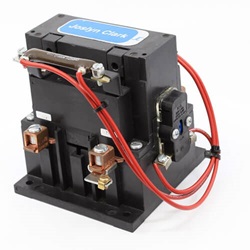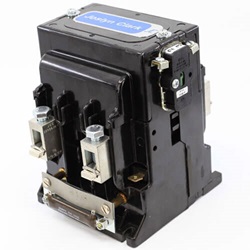DC Contactors
A DC contactor is an electrically controlled device designed to switch current on and off. DC motor contactors control current in DC circuits by closing and opening internal contacts. DC contactors control much lower voltages than AC circuits and offer the benefit of minimal arcing as the circuit opens and closes.
The main function of a DC motor contactor is simply to make and break the connection between the power source and the load. One side of contactor is fixed and the other is movable. Once energized, the generated electromagnetic force pulls the movable contact toward the stationary contact and the spring pulls the contactors apart once de-energized.
How Can We Help You With DC Contactors?
DC Contactor Product Lines

Key Features of 5DP Definite Purpose Contactors:
- Designed for DC adjustable speed drive circuits and other controls that require both normally open and normally closed power contacts.
- Compact design saves space when mounted on a panel.
- Dynamic brake N.C. contact inserts the dynamic brake resistor and can handle up to 200% of rated current each time the contactor is de-energized.
- Suitable for use in silicon controlled rectifier switching circuits.
- Built-in N.C. dynamic brake power contact feature.
- Available in a variety of sizes and voltage ratings.
- Reliable performance and long service life.
Resources

Key Features of 7400 Series Definite Purpose Contactors:
- Designed for DC motor reversing, starting, and stopping applications.
- Compact size allows for easy installation in a variety of applications.
- Rugged design for harsh environments
- High contact pressure ensures reliable performance and low contact resistance.
- Equipped with silver alloy contacts for high conductivity and long life.
- Available with a range of coil voltages for flexibility in different applications.
- Suitable for high current applications - up to 400A of DC current
- Designed for easy replacement of worn or damaged parts, reducing downtime and maintenance costs.
Resources
MOST COMMON APPLICATIONS FOR DC MOTOR CONTACTORS
DC contactors are used in a variety of industrial and automotive applications where DC circuits need to be switched on and off. Some of the most common applications for DC contactors include:- Electric vehicles: DC contactors are used in electric vehicles to control the flow of electricity between the battery and the motor.
- Battery chargers: DC contactors are used in battery chargers to switch the charging current on and off.
- Solar inverters: DC contactors are used in solar inverters to switch the DC voltage from the solar panels on and off.
- Industrial machinery: DC contactors are used in industrial machinery to control the flow of electricity to motors, solenoids, and other components.
- Uninterruptible power supplies (UPS): DC contactors are used in UPS systems to switch the DC voltage from the battery to the inverter during a power outage.
- Welding machines: DC contactors are used in welding machines to switch the welding current on and off.
- Battery management systems: DC contactors are used in battery management systems to switch the battery current on and off, and to isolate the battery from the rest of the system when necessary.
Overall, DC contactors are used in any application where high current DC circuits need to be switched on and off.
Featured Products

7001 Series

5DP3A Series

5DP8 Series
Number of Main Contacts: 1-3 Poles
Frequently Asked Questions About DC Contactors
Here are the answers to the frequently asked questions about DC motor contactors:What is a DC contactor? A DC contactor is an electrical switch used to control a DC circuit. It is typically used to switch high current loads on and off in a variety of industrial and automotive applications.
What is the difference between AC and DC contactors? The main difference between AC and DC contactors is the type of current they are designed to switch. AC contactors are used for AC circuits, while DC contactors are used for DC circuits. AC contactors are usually designed for higher voltage and lower current applications, while DC motor contactors are designed for lower voltage and higher current applications.
Can you use DC on an AC contactor? No, you cannot use DC on an AC contactor. AC contactors are specifically designed for AC circuits and are not suitable for DC circuits. Attempting to use an AC contactor for DC applications can cause damage to the contactor and the equipment.
What contactors are used for switching DC loads? DC motor contactors are specifically designed for switching DC loads. They are commonly used in applications such as electric vehicles, battery chargers, solar inverters, and other industrial applications where DC circuits need to be switched on and off.
These contactors are designed to handle high current loads and are available in a variety of sizes and voltage ratings.
Want to Know More About DC Contactors? Read Our Newest Article!

